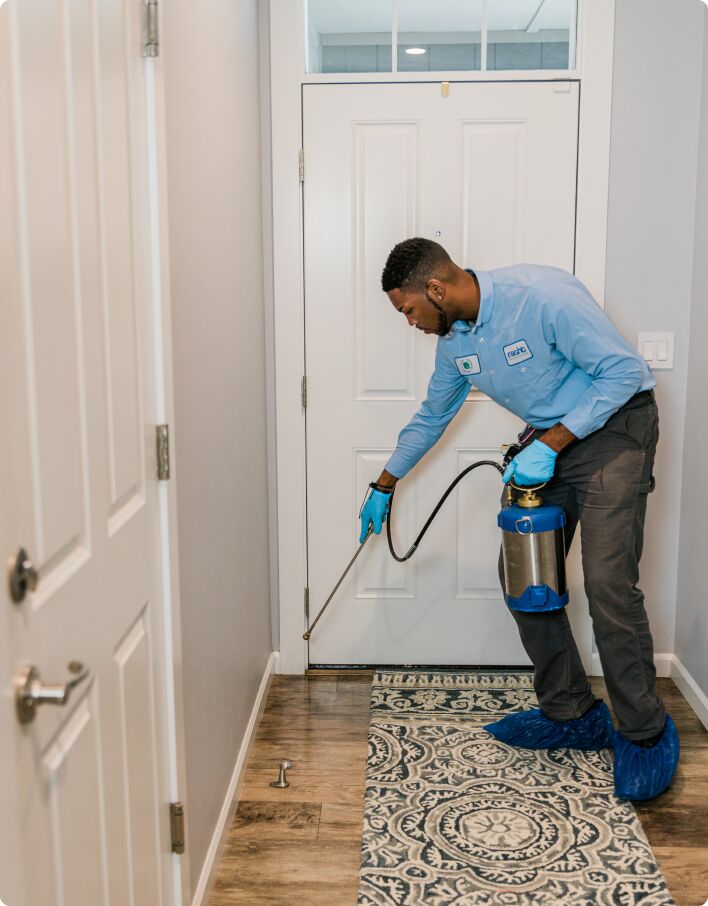Specialist A1 Portland Bed Bug Exterminator - Eliminate Bed Bugs Rapid
Wiki Article
Mastering the Art of Insect Control: Proven Techniques for Long-Term Prevention and Eradication
Parasite problems can be a relentless difficulty for organizations and house owners alike, requiring a tactical technique to efficiently manage and eliminate these undesirable burglars. By understanding the art of bug control through tried and tested methods for long-term avoidance and elimination, one can develop a proactive protection versus prospective threats. Understanding the habits of bugs, applying integrated insect monitoring methods, and using natural treatments are just a few vital components crucial to attaining long lasting success in this venture. Nonetheless, the details of maintaining tidiness, conducting routine inspections, and persistent surveillance play equally essential duties in sustaining a pest-free environment. As the fight versus parasites remains to advance, taking on a comprehensive strategy becomes extremely important in securing your home from prospective injury.Recognizing Bug Habits
To successfully carry out bug control strategies, it is necessary to comprehend the detailed habits exhibited by numerous pests in various atmospheres. By studying these habits, bug control specialists can recognize the most susceptible points in the parasite's life cycle to target interventions much more effectively.
Recognizing this, parasite control professionals can focus on securing entry points and getting rid of food attractants to hinder these pests. By attending to dampness concerns and sealing splits and holes, infestations can be substantially lowered.
Implementing Integrated Pest Monitoring
Applying Integrated Parasite Administration involves making use of an all natural approach to resolve pest concerns by combining various control techniques and strategies. This approach emphasizes avoidance, surveillance, and control of insects with a mix of organic, cultural, physical, and chemical interventions. By incorporating numerous strategies, Integrated Pest Administration (IPM) intends to decrease making use of pesticides while properly managing pest populations.One secret facet of IPM is identifying the specific insect trouble and understanding its habits and life process. This understanding aids in identifying one of the most appropriate control procedures to apply. Avoidance is also an essential concept of IPM, concentrating on removing elements that attract parasites, such as food, shelter, and water. Normal monitoring and evaluation are vital to detect insect problems early and prevent them from escalating.
Furthermore, IPM promotes using lasting and environmentally friendly insect control methods to lessen injury to non-target microorganisms and the surrounding ecosystem - a1 bed bugs exterminator portland. By embracing an Integrated Insect Administration method, individuals and organizations can properly take care of insects while lowering reliance on chemical pesticides
Making Use Of Natural Remedies
Structure upon the foundation of Integrated Parasite Management, a change in the direction of making use of natural solutions provides a green method to pest control. All-natural solutions harness the power of nature to discourage and remove bugs without the usage of severe chemicals that can damage the environment, humans, and useful organisms.
Furthermore, planting pest-repelling plants like marigolds, lavender, and mint around homes and yards can help deter pests naturally. These plants discharge smells that bugs locate unpleasant, driving them away without the requirement for chemical intervention.
Keeping Sanitation and Hygiene

Routinely examining and cleaning hard-to-reach areas such as behind appliances, under sinks, and in storage closets is vital for determining and getting rid of potential parasite environments. Clutter needs to be click this site reduced as parasites frequently look for refuge in stacks of products or particles. Carrying out a routine cleaning schedule and making certain all members of the home or employees are informed on correct hygiene practices can go a lengthy means in pest prevention. By preserving sanitation and health standards, the atmosphere ends up being much less hospitable to bugs, inevitably sustaining long-term insect control initiatives.
Regular Examinations and Monitoring
Routine assessments and checking play a crucial duty in proactively recognizing and attending to prospective bug problems before they rise. By carrying out routine evaluations of both the interior and outside of a building, bug control experts can detect very early signs of problems, bug entry factors, and problems conducive to parasite activity.Consistent surveillance enables for the early discovery of parasite issues, making it possible for speedy intervention to prevent prevalent invasions that can be costly and challenging to remove. Furthermore, normal assessments and keeping track of aid to abide by regulative demands and keep a safe, pest-free atmosphere for passengers. Implementing an aggressive approach with regular inspections and monitoring is a foundation of reliable pest administration, giving peace of mind and long-lasting security versus pest control operator insect threats.
Conclusion
To conclude, grasping the art of bug control entails understanding parasite behavior, implementing integrated pest management, utilizing natural remedies, maintaining cleanliness and health, and performing routine inspections and monitoring. By following these tried and tested strategies for lasting avoidance and elimination, people can properly handle pest infestations and create a much healthier and more secure environment for themselves and their environments.To efficiently implement insect control approaches, it is essential to understand the elaborate habits exhibited by numerous bugs in different settings (portland exterminators a1 for bed bugs). By examining these behaviors, bug control professionals can recognize the most susceptible factors in the bug's life cycle to target treatments more efficiently
Implementing Integrated Insect Monitoring entails using an alternative strategy to attend to parasite problems by combining different control tactics and strategies. By keeping cleanliness and health standards, the environment ends up being less hospitable to parasites, eventually sustaining lasting bug control initiatives.
By performing routine examinations of both the inside and exterior of a building, parasite control specialists can discover early signs of problems, pest entry points, and conditions favorable to insect task.
Report this wiki page